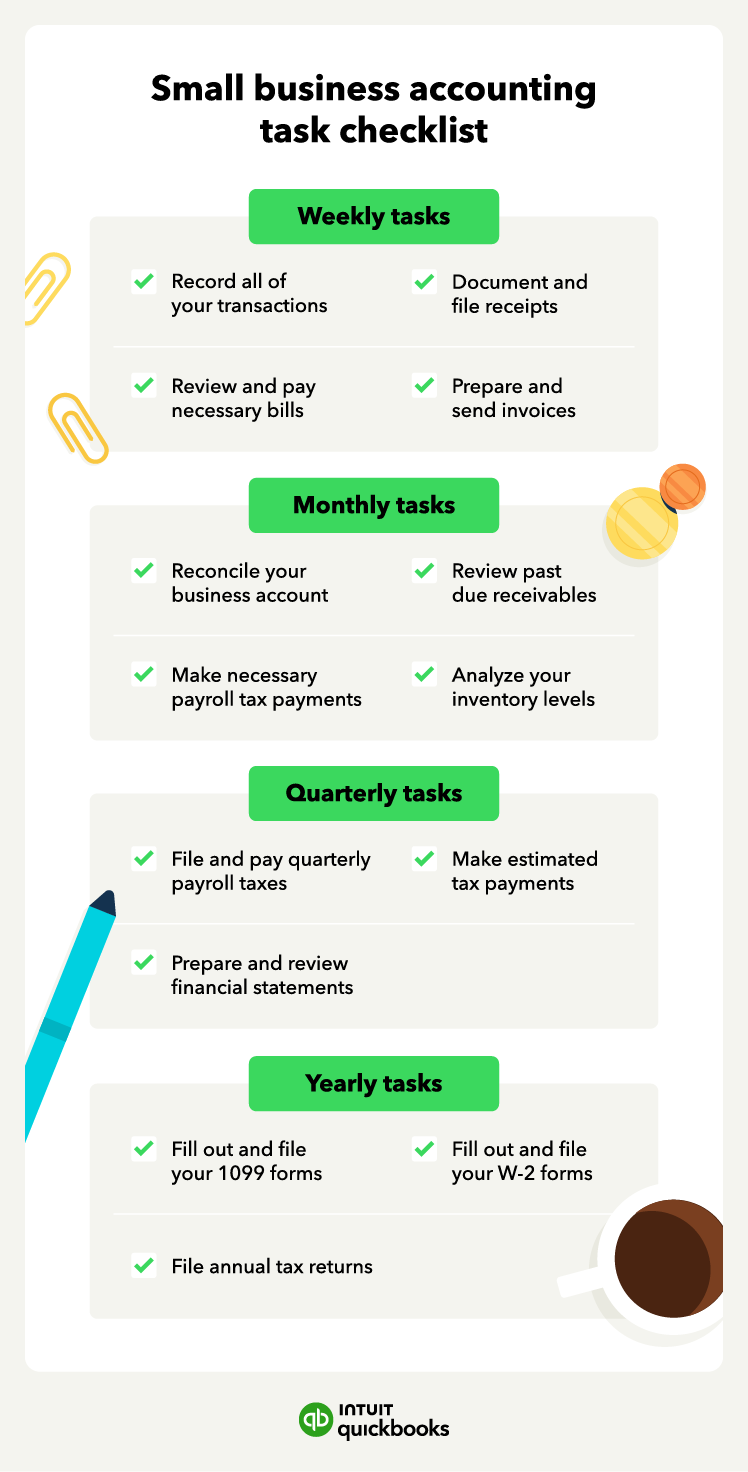Duties and job responsibilities
An accountant’s responsibilities can vary by position and organization, but here’s a general overview of their duties and what each one entails.
Prepare and review financial statements
Accountants give businesses a clear snapshot of their financial health by preparing and reviewing key financial statements. These documents usually include the so-called “Big Three” accounting statements):
These statements are cornerstone elements of any SMB manager or owner’s decision-making toolkit, but they can be complex and time-consuming to prepare, even for a small business. Some organizations may also require their financial statements to follow accounting standards like GAAP or IFRS. An accountant’s skills and training allow them to take on these tasks more efficiently and help ensure that financial statements are accurate.
Tax preparation and planning
Accountants are also typically responsible for filing, organizing, and maintaining a business’s tax documents. Businesses are required by the IRS to keep financial records, and part of accounting training includes learning relevant standards for keeping these records organized and compliant. They help make sure that all transactions are correctly recorded and verified.
In addition, accountants usually handle the day-to-day tax compliance functions every business has to follow. These include ensuring that payroll taxes (such as Social Security and Medicare taxes) are deducted correctly from employee checks, and that businesses make any required payments like quarterly estimated taxes.
Accountants can also play a critical role in helping businesses deal with revenue agencies like the IRS. A CPA or IRS Enrolled Agent has legal privileges that allow them to represent their client or employer in dealing with IRS actions like audits.
Conduct audits
In accounting, an audit is a detailed review of a company’s financial statements and/or processes. Not all accountants conduct audits, but those who do play a key role in a company’s operations.
Accountants might conduct either internal or external audits, depending on their job responsibilities. Here’s the basic difference:
- Internal audits originate inside the company and are usually conducted by in-house accountants. Their purpose is to improve company processes, such as payroll, risk management, or record-keeping. Internal audits can be a part of a firm’s standard procedures, or they might be one-off projects designed to address specific challenges.
- External audits are typically conducted by third-party independent accountants, often working for an auditing firm and almost always with CPA licenses. With an external audit, the focus is typically on verifying compliance and accuracy in the company’s financial records. Some external audits, like those conducted by the IRS, are focused on detecting fraud or tax evasion, while others might happen at the requests of investors or lenders.
Financial operations and analysis
Accountants also analyze a company’s financial performance to spot trends and interpret financial data. This can help businesses make smarter decisions and improve operations in a variety of ways.
Often, accountants help optimize a company’s financial operations. For example, they might help a business improve its cash flow by eliminating inefficiencies in its payables and receivables workflow. Accountants are also a crucial part of the budgeting process, both during budget creation and throughout the year, when they can analyze budget variances and help keep spending on track.
Furthermore, accountants offer an invaluable resource for major financial decision-making. When a business owner faces big decisions like applying for a new financing round or expanding to a new location, an accountant’s services are critical for developing scenarios and forecasts to help leaders make the best decision.
Risk assessment and management
Risk assessment involves identifying potential financial risks and developing strategies to mitigate them. Businesses hire accountants to think about these “what ifs” to keep them safe and stable from these possible issues.
An accountant who works in risk management will often be part of the effort to develop response plans for common financial risk scenarios, from market downturns to credit risk to liquidity issues. Accountants team up with risk management specialists, legal counsel, and other stakeholders to make contingency and continuity plans that can make the difference in keeping a business afloat during an emergency scenario.
In an age when data breaches are increasingly common, accountants may also work with IT and cybersecurity professionals to implement internal controls for financial data protection. From detecting irregularities in records to vetting accounting software deployments for compliance, accountants are more critical than ever in keeping financial data safe.
Regulatory compliance
Accountants keep up with the latest financial regulations and make sure the businesses they work with comply with all legal requirements so they can avoid penalties. Tax compliance is one facet that we’ve talked about, but accountants’ compliance responsibilities may extend to other types of financial operations as well.
Payroll is a common source of compliance work for accountants, especially in small companies that may not have a dedicated HR specialist. In addition to payroll taxes, they may be responsible for tasks like maintaining workers’ compensation and benefit records, and for ensuring that working practices like overtime pay follow the Fair Labor Standards Act (FLSA).
Accountants are also often responsible for keeping a business compliant with industry-specific accounting regulations. These might include HIPAA compliance for protecting patient information in healthcare accounting, or RESPA compliance for disclosures in the real estate industry.
Accounting management
Some accounting professionals occupy management or leadership roles. These accountants often have responsibilities above and beyond typical accounting duties, often including leading accounting teams, overseeing financial operations, and representing the company in financial discussions.
Accountants who manage internal teams directly often have titles like Accounting Lead or Accounting Manager. At the highest levels, accountants can hold titles like VP of Finance or Chief Financial Officer. Some accountants may also hold specialized positions like Director of Financial Planning, which focuses on long-term financial goals, or Risk and Compliance Director, which specializes in regulatory, tax, and risk issues.














